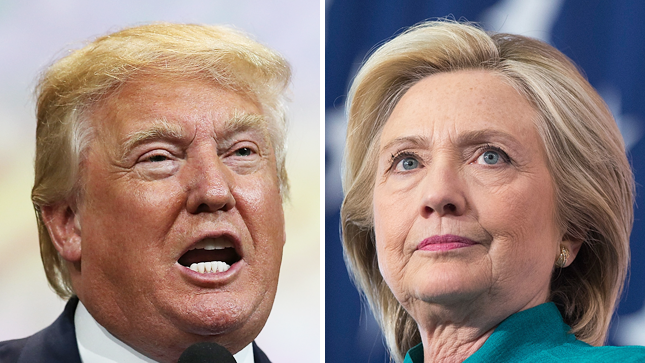ATLANTA (AP) — Republican Sen. Johnny Isakson insists he won’t be a “volunteer apologist” for Donald Trump or anyone else who utters something stupid, but that defiant independence is being sorely tested by the GOP presidential nominee’s sinking support and Democrat Hillary Clinton’s push into surprisingly competitive Georgia.
The down-ballot Senate race involving the affable, two-term Isakson wasn’t ranked as poachable for Democrats despite the changing demographics in the southern state and the higher, diverse turnout of a presidential election year. After all, reliably Republican Georgia has only voted for a Democratic presidential candidate once since 1980.
That was Bill Clinton in 1992.
Recent polls show Trump and Hillary Clinton locked in a tight race as the Democrat opens a campaign office in the state and invests in a field organization. Isakson holds a single-digit lead over first-time candidate Jim Barksdale, a wealthy investment manager whose opposition to trade deals and calls for a higher minimum wage has attracted backers of Vermont Sen. Bernie Sanders, the unsuccessful Democratic presidential candidate.
The 71-year-old Isakson, who disclosed he has Parkinson’s disease, sought to shore up his support with Republicans while appealing to independents and Democrats. He made a two-day trip around the state in late July to highlight the Georgia Chamber of Congress’ endorsement with low-key stops at large companies in five cities to tour factory floors and talk with employees.
In metro Atlanta recently, Isakson talked about his Senate work to members of a Rotary club, a business group and a Realtors’ association.
Questions about Trump’s more divisive comments proved inevitable. Isakson says he’ll support the GOP ticket but won’t answer for the nominee.
“If Donald Trump or anybody else makes a stupid statement, I’m not going to be their apologist and let the press beat up on me,” Isakson said in an interview with The Associated Press. “They’ll have to go to the person who made the stupid statement. I’ll apologize when I do something stupid because I should. But I’m not going to be the volunteer apologist for anybody else.”
He says he doesn’t expect “a lot of coattails” from either party’s presidential ticket.
Isakson’s supporters, including some still struggling to wholeheartedly support Trump, said they believe the incumbent can go it alone. Ben Hinson, a retired business owner from Macon, said he plans to support Trump because Clinton is the alternative, but he does worry that independents will be driven away from the overall GOP ticket.
“I think Johnny’s stronger in Georgia than any presidential candidate this year,” Hinson, 64, said. “I don’t see any upside to him getting close to Mr. Trump. I think Sen. Isakson can run his race quite on his own.”
With a $4 million cash advantage, his first ad of the general election made a direct pitch to Democrats, focusing on Isakson’s response to the 2009 murder of Georgian Kate Puzey while volunteering in the west African country of Benin for the Peace Corps.
Puzey’s mother, Lois, says at the end of the ad: “I’m a lifelong Democrat. I am so grateful that he was my senator.”
Jason Anavitarte, a 38-year-old health care executive from northwest Paulding County, said Isakson has support across party lines and pointed to Democratic Rep. David Scott’s plans to vote for Isakson. Scott, who is African-American, and Isakson have worked together for decades since serving in the state legislature. Anavitarte, a Republican, said that relationship is representative of Isakson’s personal appeal.
“It comes back to the idea that all politics is local,” he said.
The race could go into overtime with Isakson, Barksdale and libertarian Allen Buckley. Georgia law requires the top vote-getter to win more than 50 percent of the vote in November. If no one reaches that threshold, Barksdale and Isakson likely will wind up in a nine-week runoff.
In 2008, Republican Sen. Saxby Chambliss survived a three-week runoff after falling just short of 50 percent in a three-person general election. Republican Paul Coverdell narrowly defeated sitting senator Wyche Fowler Jr. in 1992.
With a personal investment of $3 million, Barksdale’s ads show the 63-year-old Republican-turned-Democrat wearing a flat-brim cap and declaring it proof he’s “not a politician.”
“He’s pretty much the main reason I’m going to vote this November,” said Scott Brown, a 31-year-old Sanders delegate from Duluth. “At this point, I’m trying not to pay attention at all to the presidential election. I’m hoping to work for a new Congress and get `Bernie-crats’ like Jim Barksdale elected.”
Barksdale said in an interview that he’s focused on building his profile statewide against a well-known incumbent. His campaign sees an opportunity to woo unaffiliated voters turned off by Trump’s style, but so far hasn’t made it their focus.
“Polling has gotten within single digits — for somebody who’s relatively unknown,” Barksdale said. “If we get the name identity up, and people have a chance to see me, I think they’re going to see that I’m a good choice.”
Paige Hunter, a 26-year-old who works in human resources for a school district, met Barksdale for the first time at a young voters’ group meeting this month. She was happy to hear him talk about reducing health care costs and maintaining the Affordable Care Act.
“I think people forget just two governors ago, we were still a blue state,” Hunter said.
Copyright 2024 The Associated Press. All rights reserved. This material may not be published, broadcast, rewritten or redistributed.

